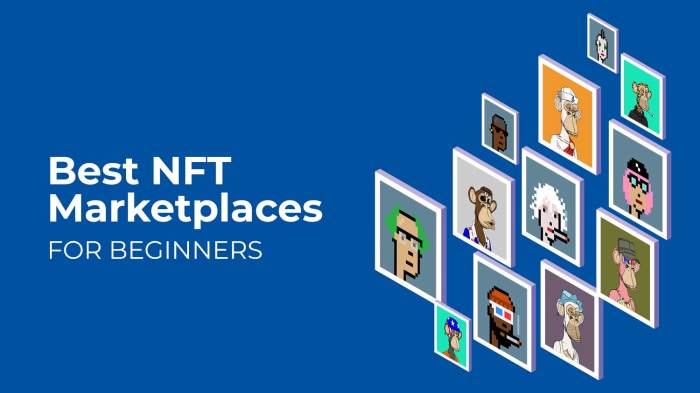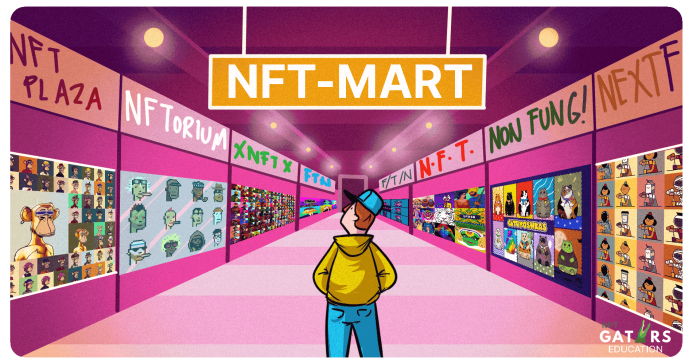NFT marketplaces are revolutionizing the way we buy and sell digital assets, creating a buzz in the digital art world and beyond. Get ready to dive into the exciting world of NFTs with a high school hip twist!
We’ll explore how these platforms work, the top marketplaces to watch, current trends, security measures, and more. So, grab your virtual backpack and let’s journey through the world of NFT marketplaces!
Overview of NFT Marketplaces

NFT marketplaces are digital platforms where individuals can buy and sell unique digital assets, known as Non-Fungible Tokens (NFTs). These marketplaces operate based on blockchain technology, allowing for secure transactions and proof of ownership for digital items.
Functionality of NFT Marketplaces
NFT marketplaces function as online market platforms that facilitate the buying and selling of NFTs. Users can create, list, and purchase digital assets, ranging from art pieces, collectibles, virtual real estate, and more. Each NFT is unique and cannot be replicated or exchanged for another asset, providing exclusivity and ownership verification.
Role of Blockchain in NFT Marketplaces
Blockchain technology plays a crucial role in NFT marketplaces by ensuring transparency, security, and authenticity in transactions. Each NFT is stored on a blockchain, a decentralized ledger that records ownership and transaction history. This immutable record prevents fraud and guarantees the provenance of digital assets.
Significance of NFT Marketplaces in the Digital Art World
NFT marketplaces have revolutionized the digital art world by providing artists with new opportunities to showcase and monetize their creations. Artists can tokenize their work as NFTs, reaching a global audience and receiving royalties for resales. This shift in the art market has democratized access to art and empowered creators to directly engage with their audience.
Popular NFT Marketplaces
When it comes to NFT marketplaces, there are several top players in the industry that stand out for their features, user experience, reputation, and the variety of digital assets they offer.
OpenSea
OpenSea is one of the most popular NFT marketplaces known for its vast selection of digital assets, ranging from art and collectibles to virtual real estate. It offers a user-friendly interface and allows users to create, buy, and sell NFTs easily.
Rarible
Rarible is another prominent NFT marketplace that stands out for its decentralized approach, allowing creators to mint and sell their NFTs without the need for approval. It also offers a unique governance token that gives users a say in platform decisions.
SuperRare
SuperRare focuses on curating high-quality digital art NFTs, making it a go-to platform for art collectors and enthusiasts. It maintains a strict curation process to ensure that only authentic and valuable artworks are available for purchase.
Nifty Gateway
Nifty Gateway has gained popularity for its partnerships with well-known artists and brands, offering exclusive drops and limited editions. It provides a seamless buying experience with support for credit card purchases, making it accessible to a wider audience.
NFT Marketplace Trends: NFT Marketplaces
As the NFT marketplace continues to evolve, several trends are shaping the industry and influencing the way creators and collectors interact with digital assets.
Successful NFT Sales
Successful NFT sales have been making headlines across various platforms, showcasing the potential for digital artwork and collectibles to fetch high prices. For example, the sale of Beeple’s “Everydays: The First 5000 Days” for $69 million on the platform Christie’s marked a significant milestone in the NFT space, highlighting the demand for unique and authenticated digital assets.
Impact of Celebrity Endorsements
Celebrity endorsements have played a crucial role in driving interest in NFT marketplaces, with notable figures like Elon Musk, Grimes, and Lindsay Lohan participating in NFT auctions and creating their own digital collections. These endorsements not only attract attention to the space but also lend credibility to NFTs as valuable investments.
Collaborations with Brands, NFT marketplaces
Collaborations between NFT platforms and brands are reshaping the landscape of the market, with companies like Nike, Coca-Cola, and Gucci venturing into the world of digital collectibles. These partnerships bring established brands into the NFT space, offering unique opportunities for collectors to own exclusive digital assets tied to well-known companies.
Security and Legal Considerations

When it comes to NFT marketplaces, security and legal considerations play a crucial role in ensuring a safe and legitimate environment for users.
Security Measures Implemented
- NFT marketplaces often use robust encryption protocols to secure user assets and data against cyber threats.
- Two-factor authentication (2FA) is commonly employed to add an extra layer of protection for user accounts.
- Cold storage solutions are utilized to store NFT assets offline, minimizing the risk of theft or hacking.
Legal Implications of NFT Transactions
- Ownership rights of NFTs can be complex due to the digital nature of these assets, leading to legal disputes over authenticity and provenance.
- Smart contracts play a significant role in defining and enforcing ownership rights, providing a transparent and immutable record of transactions.
- Copyright issues may arise when NFTs are created using copyrighted material without proper authorization, leading to legal consequences for the creators.
Smart Contracts for Transparency and Authenticity
- Smart contracts are self-executing contracts with the terms of the agreement directly written into code, ensuring transparency and automation in NFT transactions.
- These contracts help verify the authenticity of NFTs by recording ownership details on the blockchain, preventing fraudulent activities.
- Through smart contracts, creators can also receive royalties automatically whenever their NFTs are resold, ensuring fair compensation for their work.
Recent Cases of Fraud and Copyright Issues
- There have been instances of fake NFTs being sold on certain marketplaces, deceiving buyers into purchasing non-authentic digital assets.
- Copyright infringements have been reported when artists’ work is tokenized without permission, leading to legal actions against the infringers.
- Scams involving phishing attacks and fake NFT projects have also been prevalent, highlighting the importance of due diligence and security awareness among users.